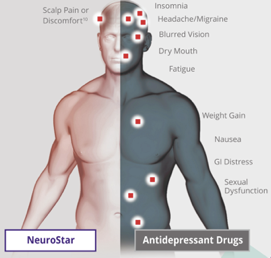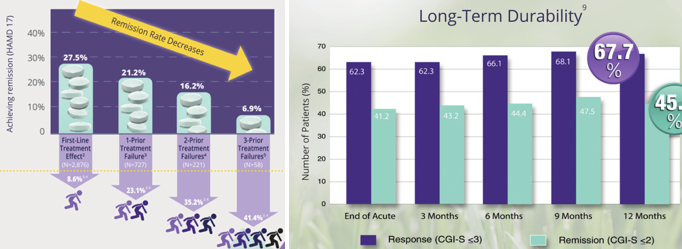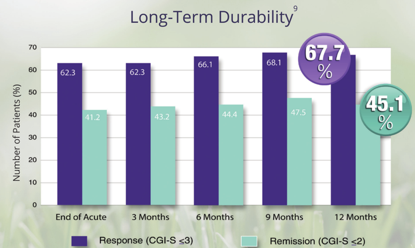
Brainsway TMS FAQ’s & Answers
1. What does T-M-S stand for?
- Transcranial Magnetic Stimulation
2. When someone calls (asking about TMS) what is your goal?
- Screen pt (age, Dx, Med trials, Metal in/near head)
- Get Insurance info IF submitting BI (Benefits Investigation)
- Schedule Clinical Consultation With Provider
- Answer basic Questions
3. Who is Brainsway TMS indicated for (looking for 4 key points)?
- Adult, MDD, unsatisfactory benefit from Meds, In the Current Episode
4. How is NS TMS different that medications (looking for efficacy and side effect)?
- The meds come with systemic side effects. The most common side effect of NS TMS is discomfort at the treatment site (transient, pts accommodate quickly).

- (reference pg 9 Flip Binder)
- Also, the chances another antidepressant will achieve remission after 3 failures is <7% (reference STAR-D pg 2 Flip Binder), the chances NS TMS will achieve remission is 40-45% (reference pg 8 Flip Binder)

5. How is NS TMS different than ECT?
- ECT – outpatient hospital setting, pt restrained/sedated, seizure induced, cognitive impairment (memory loss/confusion), must have someone drive pt to/from appt
- TMS – Provider’s office, pt not restrained/sedated, seizure NOT induced, no cognitive impairment, pt can drive self to/from treatment.
Are you Sure?:
1. What are the chances NS TMS will work?
- In the Clinical Trails, about 60-70% of patients get “better”, while 40-45% are symptom-free (reference pg 8 Flip Binder)…
But in our office we see a success rate of ______ and a remission rate of _______.
2. What about trying another medication first?
- Studies show that – after you’ve failed 3 antidepressants, the chances of Med #4 getting you to remission is <7%. So you can only imagine the unlikelihood of Med #___ working. Also, most patients will discontinue b/c of the side effects of the meds. (reference pg 2 Flip Binder)…but that’s a great question for your Provider.
3. Do I have to or will I be able to stop taking my antidepressant medications?
- The Provider will discuss your medications during the clinical consultation, but most likely he/she will ask you to stay on your meds and be consistent. He/She will evaluate you again upon completion of NS TMS to see if you can stop any medications and/or take a lesser dose.
4. When will I start to feel relief from my depression symptoms?
- Most patients start feeling better around the 4th week, but everyone is different.
5. How long has TMS been studied?
- Since 1985!….over 30 years!!!

What’s the Commitment?:
1. How long does each treatment last (each day)?
- You will be here approximately 30 minutes: I’ll get all your parameters (chair/coil setting in place), deliver the treatment (approx. 19 min), and then up/out you go
2. What are the NS TMS treatments like (does it hurt, what does it feel like)?
- You get to relax in a nice reclining chair. You will feel a tapping sensation on the front part of the left side of your head. Everyone perceives the pulses differently, but we will make you as comfortable as possible
3. What if I need more NS TMS treatments?
- The Provider will evaluate you to determine your best plan of care to achieve your best results
4. Do I need to come every day for treatments?
- You will need to come 5 days a week for 4-6 weeks and most likely for 3 additional weeks to taper off, but the Provider will make his/her recommendation during your Clinical Consultation
5. What if I miss some treatments?
- If you miss a day(s) due to unforeseen circumstances (illness, injury, etc), then we will let your Provider know and he/she will make a recommendation. However, if you have planned time away (vacation, etc) then your Provider will need to decide whether to start your NS TMS before/after your time away
One Last Thing…:
1. How long does the treatment effect last?
- They studied patients for 1 year and more patients got better during that time. Approx 1/3 had to have a few more treatments (16 Avg). (reference pg 8 Flip Binder)
- Of the 2.5 million treatments that have been delivered to ten’s of thousands of patients, some have had NS TMS and never needed any additional TMS treatments.

2. What if TMS doesn’t work?
- BUT what if it DOES!? We’ve seen such great success with NS TMS, but if for any reason you do not achieve the results you and the Provider discussed, we will have him/her re-evaluate you for next steps.
3. What are the side effects of NS TMS? Any long term effects?
- The most common side effect is discomfort at the treatment site. On occasion patients complain of a headache following treatments for the first few days. You can take an over-the-counter analgesic (Advil/Tylenol) about an hour before you come in to help prevent. (reference pg 9 Flip Binder)

4. How does NS TMS work? KEEP IT SIMPLE
- NS TMS uses a MRI strength magnet to stimulate the area of the brain that controls depression to increase blood flow, glucose metabolism, and the chemicals (neurotransmitters) that help you feel better (reference pg 3 and page 6 Flip Binder)

5. Will NS TMS help with my Anxiety? OCD? Tinnitus? Other? (This is all Off-label, so let the Provider address)
- NS TMS is indicated for depression. Your provider can discuss other uses during your Clinical Consultation.
